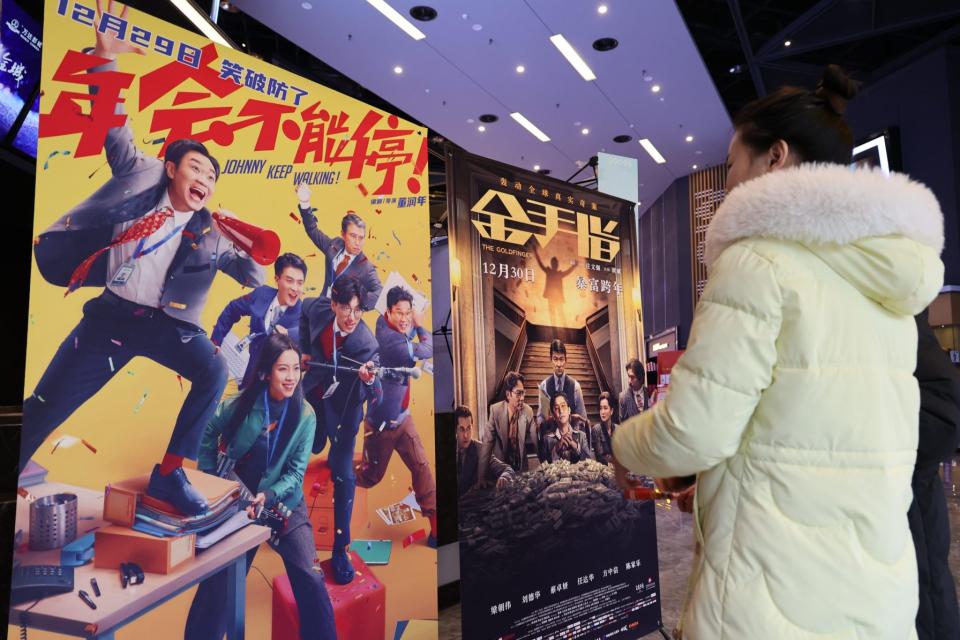The anti-corporate tirade ‘Johnny Keep Walking’ topping China’s box office is the tonic we all need–but not because it hates business

I didn't expect much when I was dragged into Chinese movie Johnny Keep Walking!–and I certainly didn't expect a cathartic experience that made me reflect on the world of work, corporate culture, and nothing less than the meaning of modern life. The English title sounds like a whiskey advert—and most Chinese comedies I've watched in recent years involved either an element of time travel or a Shallow Hal-ish storyline. But this movie is number one at the Chinese box office, and one of my New Year's resolutions is to stop raining on everyone's parade.
It's no wonder Johnny has outpaced all the other new year releases in the Chinese mainland. Similar to what's happening in the U.S. and Europe, China's populace is concerned about its economic prospects, a shrinking workforce, and a disengaged youth. Gen Zers are rebelling against traditional Chinese work values–and their "lying flat" philosophy is threatening to upend the world's second-biggest economy in a deep and permanent way. Working in a glass tower and living in the big city may still be the dream for a bumpkin like Jianlin, but China's young urbans are starting to head in the opposite direction and seeking more comfortable lifestyles in the countryside. So what is it about Johnny that's resonating with this disaffected cohort? It's a lot more than an anti-corporate tirade (although it is a lot of that at times).
The film's Chinese title makes more sense and roughly translates to Don't Stop the Gala, a reference to the lavish office parties annually thrown by Chinese corporations. Like many (even most?) office parties around the world, the film depicts an exercise in hypocrisy intended to plaster over whatever cracks arose through the previous challenging year in business.
Names are indeed critical in understanding the film. As Chinese social media users were quick to point out, the character's anglicized names are all about wordplay, Easter eggs, and barely hidden references. The main character's name, Jianlin Hu aka Johnny, seems to be a reference to Jianlin Wang, the CEO of Chinese real estate, entertainment, and tourism conglomerate Wanda Group. He is employee of the year at his rural factory every year and the only volunteer to perform at the annual gala's talent show. The other workers appreciate his leadership and dedication, respect him, and call him chief. But he's left behind as the company grows into a major conglomerate thanks to China's opening to international markets.
This doesn't deter Jianlin's unwavering loyalty to the company and trust in its leaders. The major plot development centers on this, as Jianlin's scummy co-coworker Zhengzhi Zhuang (which sounds like "feigns integrity" in Chinese) bribes a senior executive to get transferred to the firm's swanky headquarters, but the company's corrupt and incompetent leadership give the cushy job to Jianlin by mistake. The model worker, of course, believes he got the post on merit, and by this use of dramatic injury we, the audience, get to watch the absurdity of navigating a corporation rife with mismanagement.
What ensues is a hilarious exploration of nonsensical corporate culture practices, starting with rebaptising Jianlin as "Johnny." His manager, Jieke Ma aka Magic (a reference to Alibaba Group founder Jack Ma), rapidly notices that a mistake was made—but ever the reliable, compliant workhorse, he opts for silence, keeps his head down, and chooses to do Johnny's work instead of exposing him. He also drafts in Penny, an ultra-competent contractor who can never be made permanent because she's a straight shooter (and whose English name sounds like "pan ni," the Chinese word for rebellion), to help out.
Johnny's clumsy handling of the company's plan for mass layoffs, aided by luck, employees' reluctance to speak up, and a rumor that he is the chairman's son, paradoxically results in him rising through the ranks. He learns all the hallmarks of a corrupt senior executive: pitting employees against each other, pretending he understands everything when he's clueless, and blagging his way along with the Chinese version of corporate speak, including "aligning the granularities," "focusing on the vertical fields," "breaking through the underlying logic," "completing new business formats," and "forming a closed-loop matrix."
Everything comes crashing down when Johnny's factory is slated for closure and his old comrades are selected for "optimization." Johnny wakes up and takes a stand. Magic, the diligent family father who doesn't like to make waves, has had enough. Penny, always up for a fight, is on board. They are going to expose the corrupt executives at the annual gala.
And herein lies perhaps the only disappointment in this corporate culture epic: a predictable ending. The chairman cracks down on the bad guys and rights all the wrongs. The familiar "good king, bad ministers" trope that elicits a sigh of relief from every censor in the world. The film is however salvaged by an ending within the ending. Even though Penny finally gets her long-awaited permanent position, she rejects it and decides to pursue her passion as a singer-songwriter. Art is freedom.
Mohamed El Aassar is Fortune’s commentary editor.
More must-read commentary published by Fortune:
Economic pessimists’ bet on a 2023 recession failed. Why are they doubling down in 2024?
‘Parroting Putin’s propaganda’: The business exodus over Ukraine was no Russian bonanza
WEF president: ‘It’s time to revitalize trade—and reverse the trend of Slowbalization’
The anti-DEI movement has gone from fringe to mainstream. Here’s what that means for corporate America
The opinions expressed in Fortune.com commentary pieces are solely the views of their authors and do not necessarily reflect the opinions and beliefs of Fortune.
This story was originally featured on Fortune.com

 Yahoo Finance
Yahoo Finance 